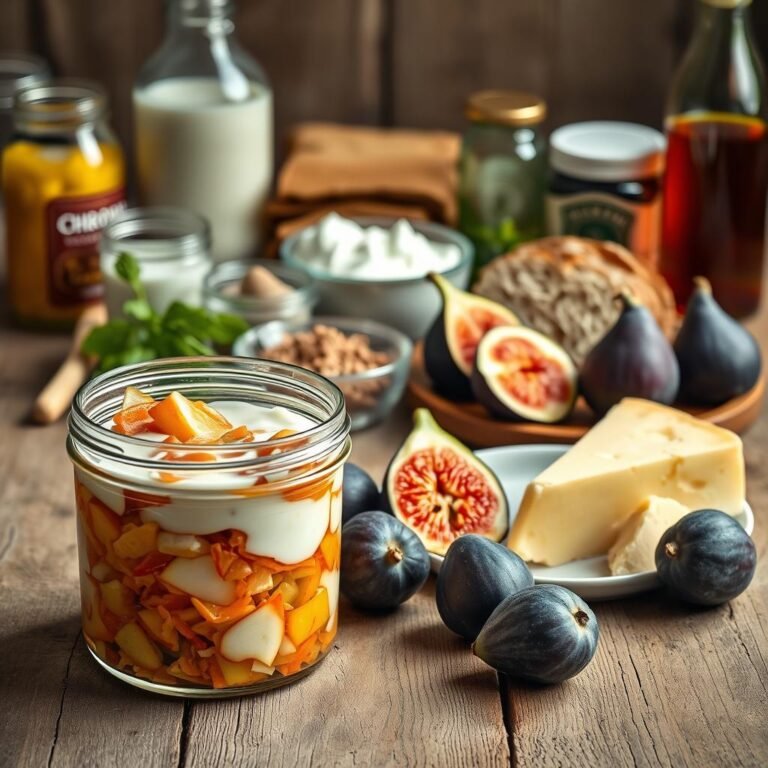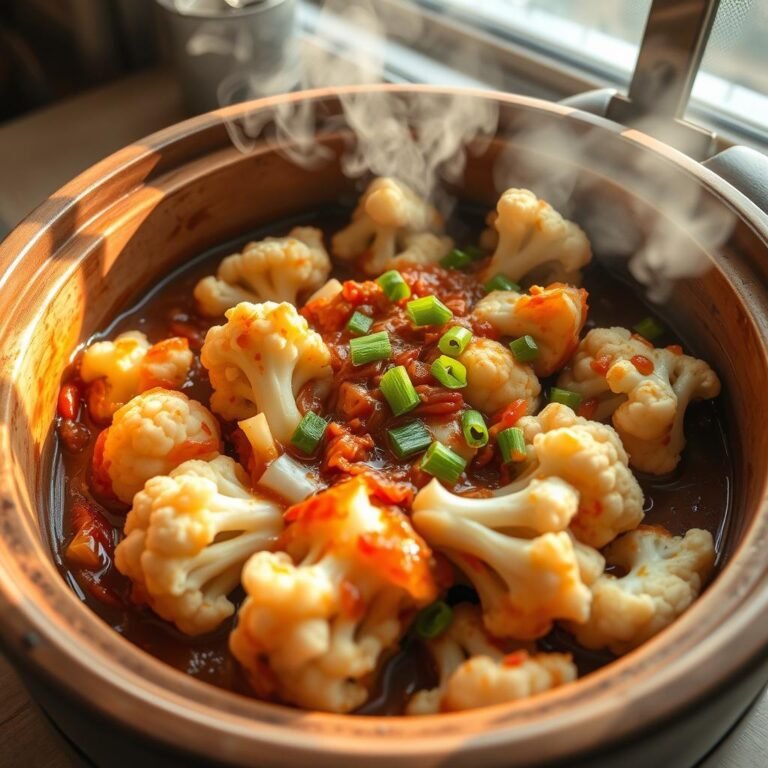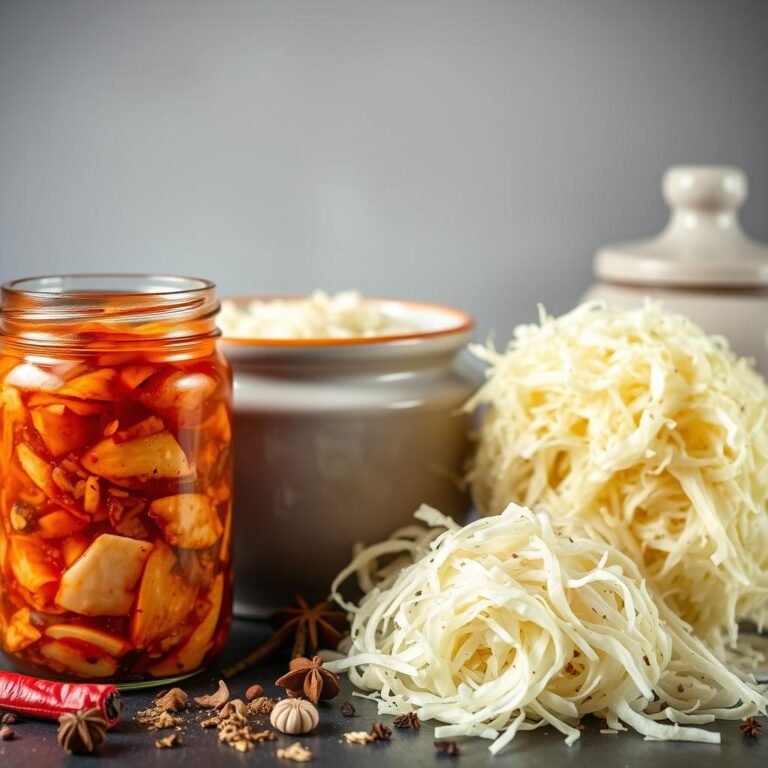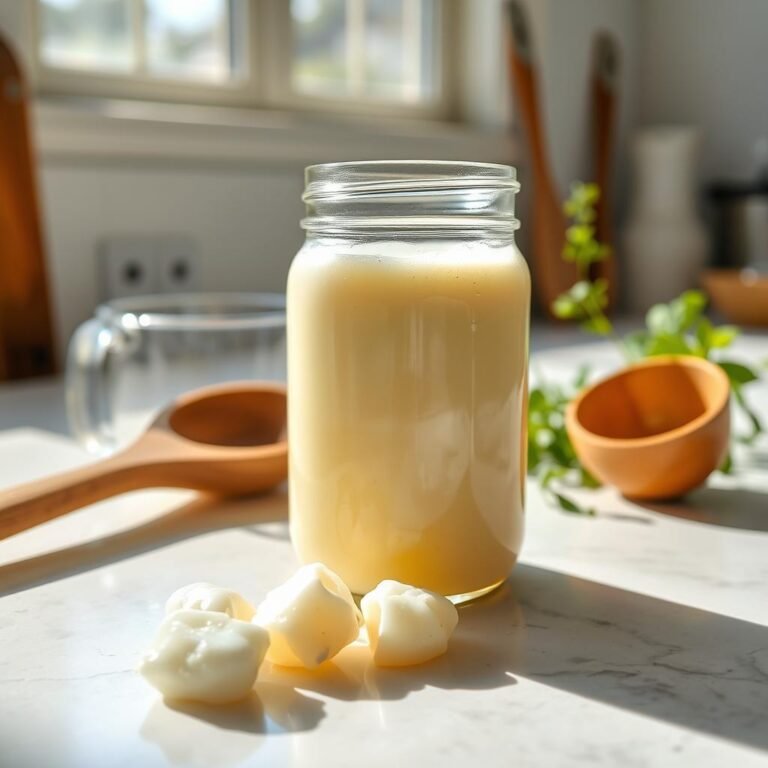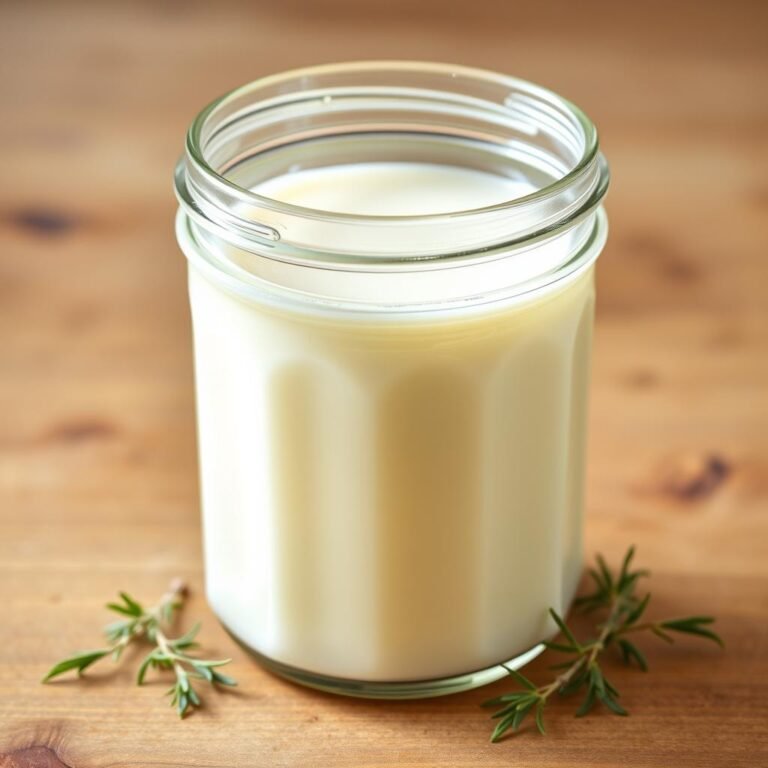Do Fermented Chili Peppers Have Probiotic Benefits?
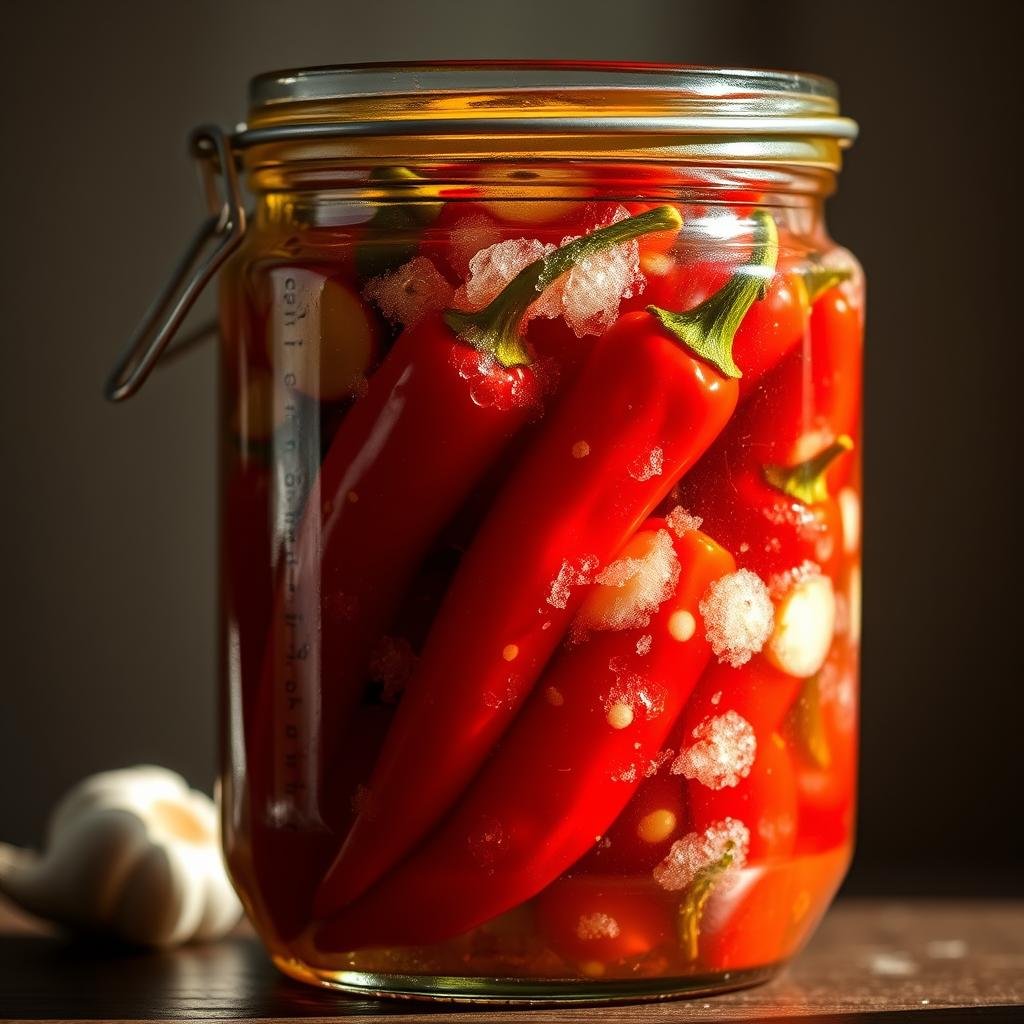
Fermented chili peppers are becoming more popular. They’re not just for their spicy taste. They might also help your gut health.
These spicy foods go through a natural process. This process could make your gut microbiome better. It might also help with digestion.
This section looks at how these peppers can be good for you. They can make your food taste great and help your gut at the same time.
Introduction to Fermented Chili Peppers
Fermented chili peppers are a tasty treat made through lacto-fermentation. This old method keeps peppers fresh and boosts their taste and health. Making fermented peppers at home is fun and rewarding, leading to a pantry full of spicy delights that are good for your gut.
What Are Fermented Chili Peppers?
Fermented chili peppers are made by letting natural bacteria turn the peppers’ sugars into lactic acid. This makes them tangy and full of flavor. The process starts by soaking the peppers in a salty solution. This helps good bacteria grow and keeps bad ones away.
Historical Background of Fermentation
Fermentation has been around for thousands of years. Ancient cultures worldwide used it to keep food fresh. From kimchi in Korea to sauerkraut in Germany, these methods have been passed down.
These old ways of preserving food helped keep communities fed. They also helped create unique flavors and traditions. Today, we keep these traditions alive by fermenting peppers at home. It’s a way to enjoy tasty, nutritious food while connecting with our past.
Probiotic Benefits of Fermented Chili Peppers
Fermented chili peppers are gaining fame for their probiotic perks. They go through a change during fermentation. This change makes them full of good bacteria that boost gut health and help with digestion.
How Fermentation Promotes Gut Health
Fermentation breaks down sugars with the help of bacteria and yeast. This makes probiotics in fermented chili peppers. These probiotics help keep the gut microbiome in balance.
This balance is key for better nutrient absorption and a healthy digestive system.
The Role of Probiotics in Digestion
Probiotics from fermented chili peppers are vital for digestion. They help break down food better, improving digestion. They also make enzymes that help absorb nutrients, making digestion smoother.
Eating probiotic chili peppers regularly keeps your digestive system strong. It can also cut down on bloating and indigestion. Adding these fermented foods to your diet can keep your gut healthy and improve your overall health.
Spicy Fermented Foods and Their Health Benefits
Spicy fermented foods are packed with probiotics and capsaicin. These two work together to boost your health. Capsaicin, found in chili peppers, helps your body burn calories and fight inflammation. This makes spicy fermented foods a great choice for a healthy diet.
Boosting Metabolism with Capsaicin
Spicy fermented foods can kickstart your metabolism. Capsaicin in chili peppers makes your body burn calories to produce heat. This metabolism boost helps with weight control and boosts energy. Adding spicy fermented foods to your meals can help you burn more calories.
Anti-Inflammatory Effects of Spicy Foods
Capsaicin also fights inflammation. This is good for your digestive system and overall health. Chronic inflammation can lead to diseases like arthritis and heart problems. Eating spicy fermented foods can help reduce inflammation and improve your health.
Spicy fermented foods do more than just boost metabolism. They also have strong anti-inflammatory effects. These benefits can help your heart by lowering blood pressure and cholesterol. This supports your overall health and well-being.
| Health Benefit | Description |
|---|---|
| Metabolism Boost | Capsaicin enhances thermogenesis, increasing calorie burning. |
| Anti-Inflammatory Benefits | Reduces inflammation, which can lower the risk of chronic diseases. |
| Heart Health Support | Lowers blood pressure and cholesterol levels. |
The Fermentation Process of Chili Peppers
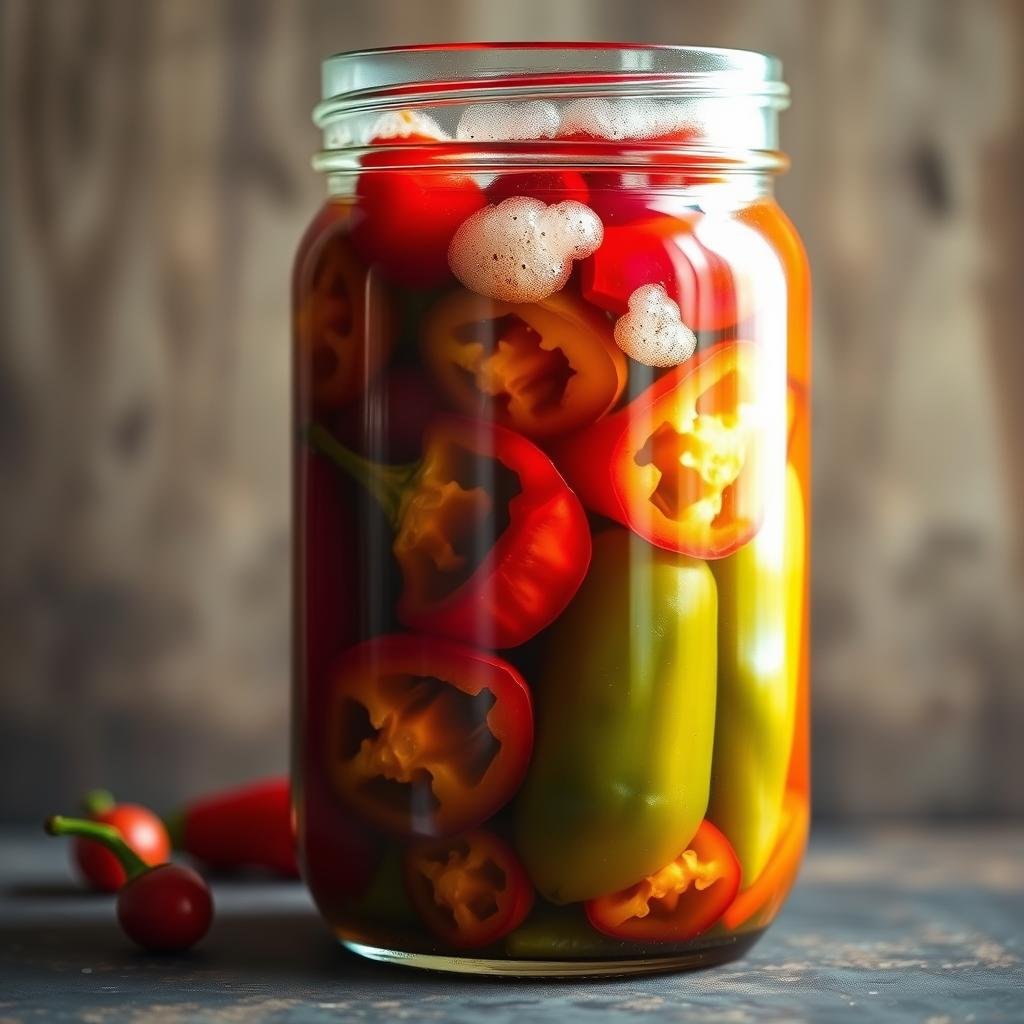
Fermenting chili peppers is both an art and a science. It turns fresh peppers into tasty lacto-fermented chili peppers. You need salt, water, and the right temperature for success. This guide will show you how to make your own homemade fermented hot sauce.
Start with fresh chili peppers. Clean them well and take off the stems. Then, mix non-iodized salt with water. Use 2-3 tablespoons of salt for every quart of water. This brine preserves the peppers and helps with fermentation.
Put the chili peppers in a clean jar and cover them with brine. Make sure they’re fully covered to avoid air. Use a weight to keep them down. Seal the jar but not too tight; let the gases out.
Keep the jar at room temperature, between 65-75°F. This will take a few days to weeks, depending on what you like. The good bacteria will make the peppers tangy. Taste them to see if they’re fermented enough.
After fermentation, you can make homemade fermented hot sauce. Strain the peppers and blend them with some brine. This hot sauce adds flavor and is good for your gut.
Now you know how to ferment chili peppers. Start making your own lacto-fermented chili peppers. Enjoy their taste and health benefits.
How to Make Fermented Chili Peppers at Home
Fermenting chili peppers at home is a fun and tasty project. It mixes cooking with science. This fermentation guide will show you the key steps, ingredients, and tips to do well.
Step-by-Step Guide
- Choose fresh, high-quality chili peppers. Clean them well but don’t overdo it. This keeps the natural bacteria for fermentation.
- Cut the peppers into equal pieces. This helps them ferment evenly.
- Make a brine solution of 3-5% salt by mixing it in water. Pour this brine over the peppers in a vessel, making sure they’re covered.
- Seal the vessel. If it doesn’t have a valve, open it daily to let out CO2.
- Keep the jar at about 70°F (21°C) for a month. This is the best temperature for fermentation and flavor.
- After fermenting, move the peppers and brine to the fridge. They can stay there for a long time.
Ingredients You’ll Need
- Fresh chili peppers
- Non-iodized salt
- Filtered water
- Air-tight fermentation vessel
Tips for Successful Fermentation
Follow these tips for a successful fermentation:
- Use non-iodized salt. Iodized salt can stop Lactobacillus bacteria from working.
- Keep the temperature steady. Changes can mess up fermentation.
- Make sure all peppers are under the brine to stop mold.
- If your vessel doesn’t have a valve, open it daily to avoid explosions.
| Key Aspect | Details |
|---|---|
| Salt Concentration | 3-5% |
| Fermentation Temperature | 70°F (21°C) |
| Fermentation Time | Approximately one month |
| Storage | Refrigerate after fermentation |
Improving Digestion with Probiotic Foods
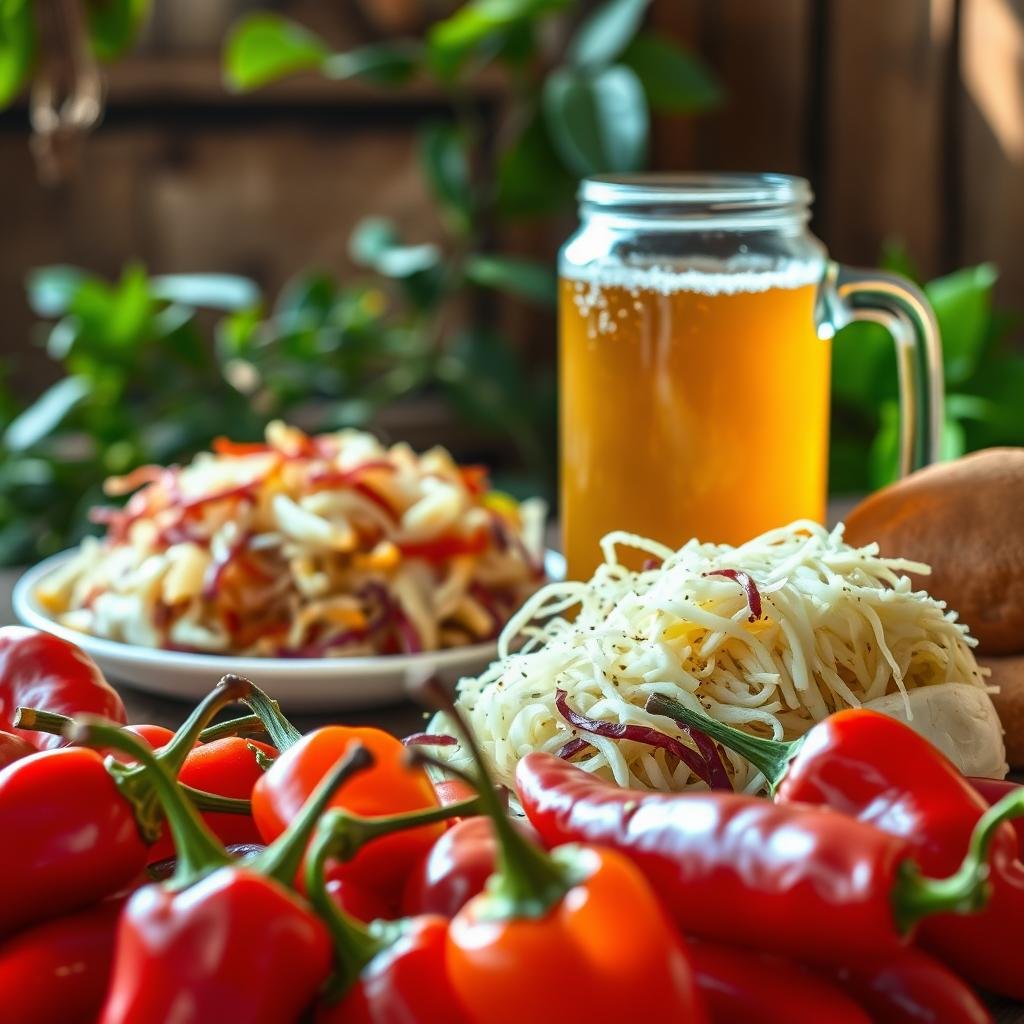
Eating more probiotic-rich foods can really help your digestion. Fermented chili peppers, for example, are full of good bacteria for your gut. This helps with digestion and cuts down on bloating.
Capsaicin in chili peppers boosts your metabolism and helps your gut. Fermenting chili peppers makes these benefits even better. It mixes capsaicin’s good effects with probiotics.
Fermented chili peppers are great in dishes like kimchi and hot sauces. They add flavor and help your digestion. Eating more probiotic foods balances your gut flora. This leads to better mood, skin, and immunity.
| Benefits | Details |
|---|---|
| Boost Metabolism | Capsaicin increases metabolic rate and aids in fat digestion. |
| Enhance Immunity | Fermented foods support gut health, which is key for a strong immune system. |
| Reduce Bloating | Probiotics and digestive enzymes help reduce bloating and discomfort. |
| Improve Gut Flora | Fermented chili peppers encourage the growth of good microbes. |
Spicy food probiotics from fermented chili peppers and other fermented foods are great. They boost immunity, reduce bloating, and improve digestion. Adding these foods to your diet can greatly improve your digestive health.
Popular Fermented Chili Pepper Recipes
Fermented chili peppers add a tangy spice to any dish. They make food more exciting. Let’s explore two favorite recipes: homemade fermented hot sauce and fermented chili paste.
Homemade Fermented Hot Sauce
Fermenting chili peppers makes their flavors better. It adds depth to the sauce. Start with fresh chilies like habaneros or jalapeños. Mix them with garlic and salt, then put the mix in a fermentation container.
- Step 1: Blend 2 cups of chopped chilies, 4 garlic cloves, and 1 tablespoon of salt.
- Step 2: Pour the blend into a sterilized jar, leaving an inch of headspace.
- Step 3: Seal the jar and let it ferment at room temperature for 1-2 weeks.
- Step 4: After fermentation, blend the mixture again, adding water or vinegar to achieve the desired consistency.
This homemade hot sauce is bold and tangy. It’s great for adding flavor to your meals.
Fermented Chili Paste
Fermented chili paste is great in many dishes. It’s made with fresh chilies, garlic, ginger, and salt. This paste adds deep, rich flavors to your cooking.
- Step 1: Combine 3 cups of chopped chilies, 5 garlic cloves, a thumb-sized piece of ginger, and 2 tablespoons of salt in a food processor.
- Step 2: Blend until you achieve a coarse paste.
- Step 3: Transfer the paste to a clean jar, pressing down to remove air pockets and leaving an inch of headspace.
- Step 4: Seal the jar and ferment at room temperature for about 1-2 weeks until the desired tanginess is achieved.
This fermented chili paste is versatile. Use it in soups, stews, marinades, and sandwiches. It’s a favorite among those who love spicy flavors.
Differences Between Pickled and Fermented Chili Peppers
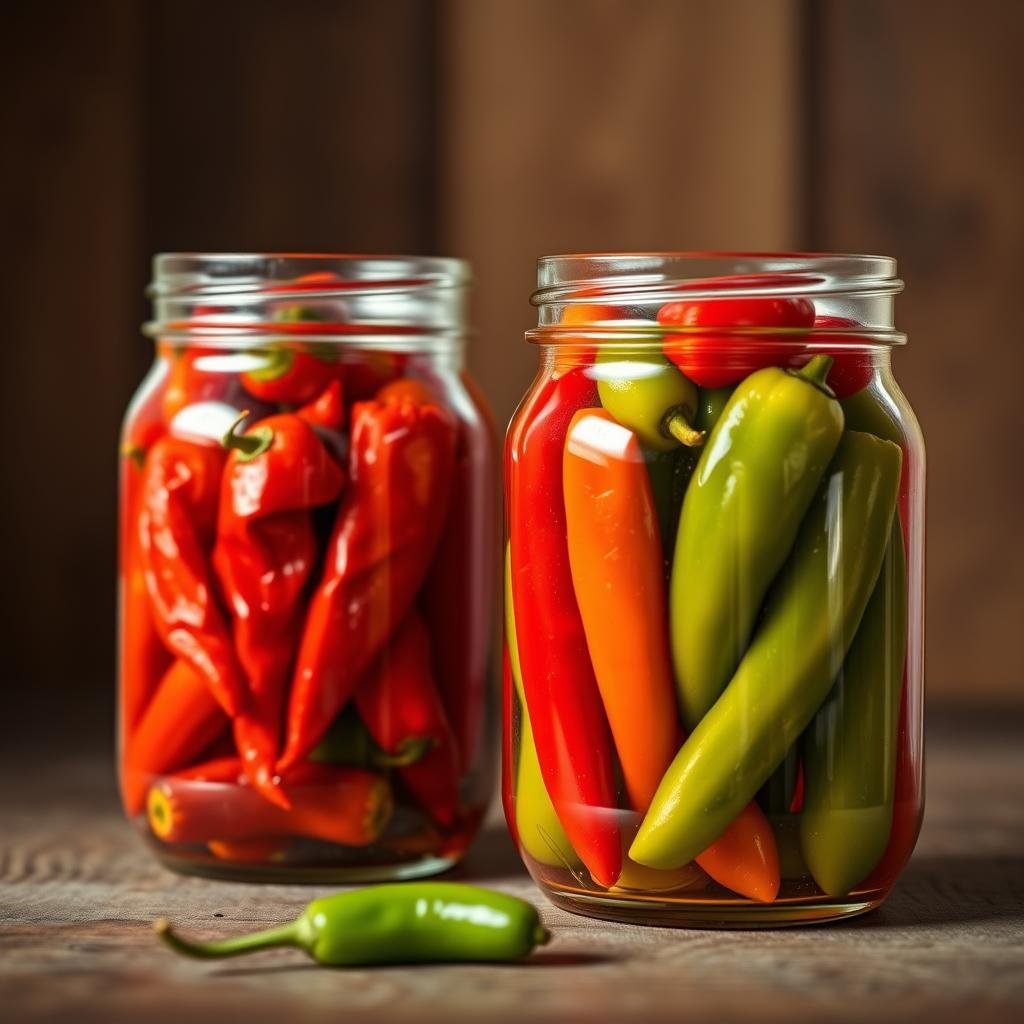
Pickled and fermented chili peppers have different benefits and tastes. They are preserved in different ways. Knowing these differences helps you pick what’s best for your health and taste.
Health Benefits Comparison
Fermented peppers are full of probiotics. These help your gut and boost your immune system. Pickled peppers, made with vinegar, don’t have probiotics. But they are full of vitamins and antioxidants.
Flavor Profile Differences
Pickled peppers taste tangy and acidic from vinegar. They give a sharp, crisp bite. Fermented peppers have a deep, umami flavor. They taste slightly sour and bubbly from lactic acid.
| Aspect | Pickled Peppers | Fermented Peppers |
|---|---|---|
| Probiotic Content | No | Yes |
| Preservation Method | Vinegar | Lactic Acid |
| Flavor Profile | Tangy, Acidic | Rich, Umami, Sour |
| Health Benefits | High in vitamins and antioxidants | Improves gut health, enhances immunity |
The Science Behind Fermentation and Probiotics
Fermentation is a cool process that helps us understand probiotics better. It breaks down sugars with the help of tiny living things like bacteria and yeast. This makes food last longer and even better for us.
When we talk about chili peppers, fermentation is key. It creates good bacteria that are great for our health.
Exploring the science of fermentation shows us how good bacteria help our guts. These bacteria grow in chili peppers and fight off bad bacteria. This keeps our gut healthy.
Probiotics are important for our health. They help us digest food better, boost our immune system, and even fight inflammation.
Good bacteria like Lactobacillus plantarum, Lactobacillus alimentarius, and Lactobacillus brevis are found in fermented chili peppers. They help lower cholesterol, fight off bad bacteria, and keep our gut healthy. Eating fermented chili peppers adds spice to our meals and boosts probiotic benefits.
| Bacterial Strain | Key Probiotic Benefits |
|---|---|
| Lactobacillus plantarum | Improved gut health, antioxidant properties |
| Lactobacillus alimentarius | Anti-inflammatory effects, immune support |
| Lactobacillus brevis | Cholesterol-lowering effects, modulation of gut microbiome |
Using Fermented Chili Peppers in Everyday Meals
Adding fermented chili peppers to your meals is fun and healthy. They add heat and good bacteria for your gut. This makes your food taste better and is good for you.
Creative Recipe Ideas
Try new things in the kitchen with fermented peppers. Add them to scrambled eggs for a spicy start. Or mix them into salsa for a zesty twist.
They’re also great in grilled cheese or tacos. This adds a special flavor to your meals.
Incorporating Them into Your Diet
To add fermented chili peppers to your diet easily, start small. Add a little to your food and more as you like it. They can make many dishes better, like soups and pasta sauces.
By eating these peppers, you get tasty meals and health benefits. They help your digestion with their probiotics.
- Scrambled Eggs: Stir in some chopped fermented peppers for a spicy start to your day.
- Salsas and Dips: Add a flavorful punch by mixing them into salsas or guacamole.
- Sandwiches: Upgrade your sandwich game with a tangy, spicy layer of fermented peppers.
- Tacos and Burritos: Incorporate them as a zesty topping to your favorite Mexican dishes.
- Soups and Stews: Elevate the flavor profile of your soups with a few pieces of fermented chili peppers.
The Connection Between Gut Health and Mood
Research shows a strong link between gut health and mood. This is thanks to the gut-brain axis. It’s a system where our gut and brain talk to each other.
The Gut-Brain Axis
The gut-brain axis connects our gut and brain. It uses signals like neurotransmitters and hormones. Foods like fermented chili peppers can help our gut health.
Capsaicin in chili peppers changes our gut bacteria. It also boosts vitamin C, helping good bacteria grow. This can fight brain inflammation and keep our gut healthy.
Impact of Probiotics on Mental Health
Probiotics from fermented foods are key to better mood. Eating fermented chili peppers can improve our gut health. This can make us feel happier and less anxious.
Omega-3 fatty acids in these peppers also help our brain. They make neurotransmitters like serotonin. Studies show probiotics can help with brain health. To learn more, check out this research on the gut-brain axis.
Potential Risks and Considerations
Fermented chili peppers are good for health, but we must know the risks. It’s important to store them right to stay safe. Knowing who should avoid these foods is key, too.
Who Should Avoid Spicy Fermented Foods
People with stomach problems might not like these foods. Pregnant women, young kids, and those with food allergies should be careful. Also, some medicines might not mix well with these foods.
Handling and Storage Tips
It’s important to handle and store fermented chili peppers right. This keeps them safe and good for you. Here are some tips:
- Put them in airtight containers, like glass jars, to keep air and germs out.
- Store them in a cool, dark place, like the fridge, to keep them fresh longer.
- Use clean tools when you touch them to avoid germs.
- Write the date on the container so you know how long they’ve been there.
Let’s look at some storage tips:
| Storage Method | Recommendation | Benefits |
|---|---|---|
| Refrigerator | Highly Recommended | Prevents spoilage and extends shelf life |
| Room Temperature | Limited Use | Short-term storage only |
| Dark Pantry | Alternative | Preserves flavor, short-term storage |
By following these tips, you can enjoy fermented chili peppers safely. This way, you get their health benefits without risks.
Buying Guide: Choosing Quality Fermented Chili Peppers
When picking out fermented peppers, there are key things to look for. A good guide helps you choose wisely.
First, check the ingredients. Good fermented chili peppers should have organic chili peppers, salt, and water. They should have few or no additives.
Next, look at how they were fermented. Traditional methods that use natural brine are best. They taste better and are healthier. Stay away from vinegar-based pickling, as it lacks probiotics.
Don’t forget about the packaging. Choose airtight jars to keep the peppers fresh. Also, look for clear containers. They let you see if the peppers are okay.
| Consideration | Quality Indicators |
|---|---|
| Ingredients | Organic chili peppers, salt, minimal preservatives |
| Fermentation Method | Natural brining, traditional fermentation processes |
| Packaging | Airtight, transparent containers |
Remember these tips to pick the best fermented chili peppers. They’ll make your meals better and give you health benefits. This guide helps you make smart choices every time.
Conclusion: Why Fermented Chili Peppers Are a Healthful Choice
Fermented chili peppers are great for your gut and fight inflammation. They are full of probiotics, which help your digestion. Capsaicin in them also boosts your metabolism and fights inflammation.
We looked at how fermentation makes chili peppers even better. It adds good probiotics to them. We also shared easy recipes for homemade hot sauce and chili paste.
These foods can even help your mood. Fermented chili peppers are tasty and good for you. They can make your diet better and even improve your mood.
Try adding them to your meals for more health benefits. You can make them at home or buy them. They are a great choice for a healthy diet.
